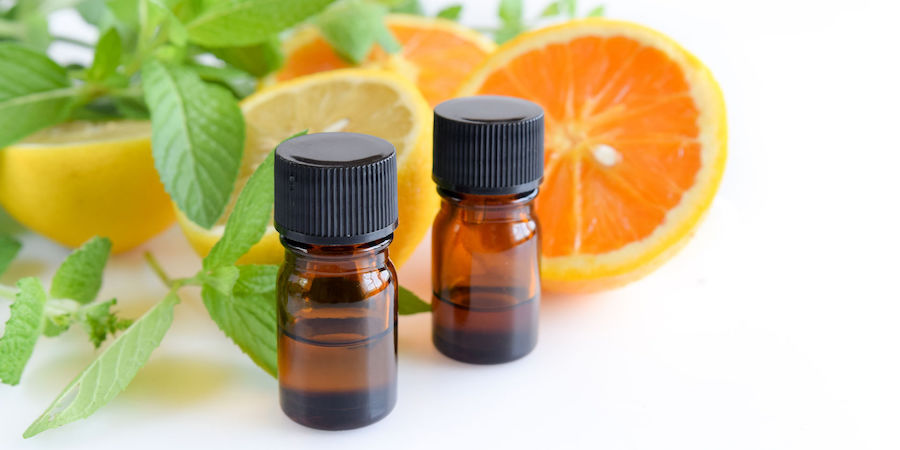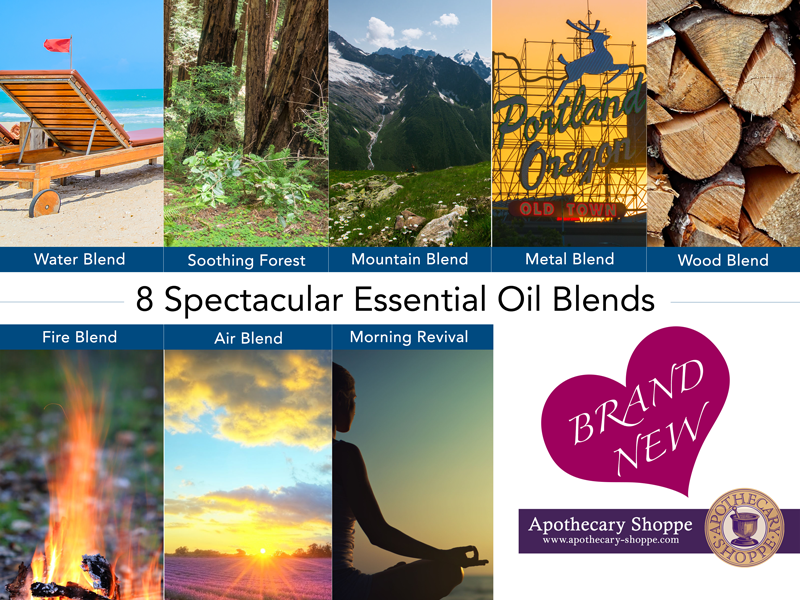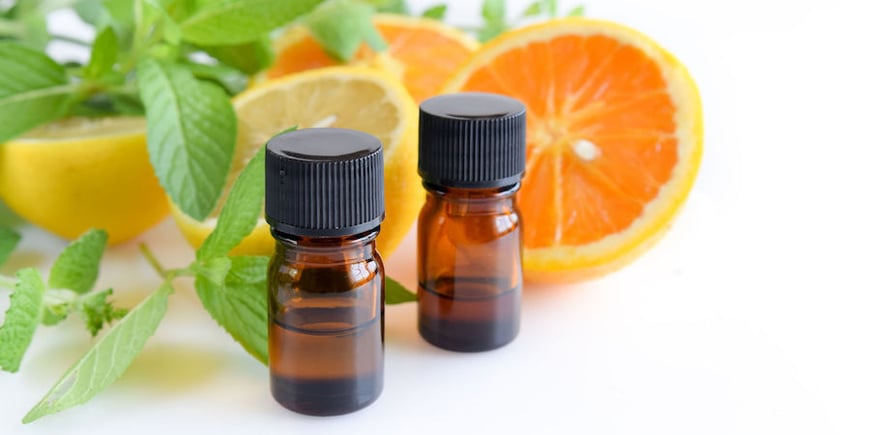 There has been more open discussion than ever in the health and wellness community about emotional issues like depression and anxiety. Talking about this difficult topic is an enormous step forward on the road to supporting those in need. Questions a Registered Aromatherapists (RA) may be asked is: How does aromatherapy work with sadness and nerves? And Can essential oils REALLY help?
There has been more open discussion than ever in the health and wellness community about emotional issues like depression and anxiety. Talking about this difficult topic is an enormous step forward on the road to supporting those in need. Questions a Registered Aromatherapists (RA) may be asked is: How does aromatherapy work with sadness and nerves? And Can essential oils REALLY help?
With a 2014 study showing a link between anti-anxiety medications and dementia[1], there is more reason than ever for RAs to research the uplifting benefits of essential oils. Here are three essential oils that research has shown can help support healthy mood.
Bergamot: A Powerful Mood-Booster
One essential oil that stands out as a mood-booster is bergamot Citrus aurantium (L.) var. bergamia. Many citruses are acknowledged for their uplifting effects, but bergamot is particularly powerful.
There are a lot of historical and anecdotal reports of the calming and cheering effects of bergamot essential oil. But there are also scientific studies supporting these claims.
A 2014 study with 58 hospice patients presented some interesting conclusions. [2] The hospice patients were given hand massages once a day for one week with an essential oil blend in 1.5% dilution with sweet almond oil. The essential oil blend consisted of these essential oils in equal ratios:
- Bergamot C. aurantium var. bergamia
- Frankincense Boswellia carterii (Birdw.)
- Lavender Lavandula angustifolia (Mill.)
Here’s the good news: all the patients who received the aromatherapy hand massage reported less pain and depression. [3] However, no tests were done on the separate essential oils. This study shows that aromatherapy massage with this specific essential oil blend is more effective for pain and depression management than massage alone. The next step would be to test the individual oils in a similar study.
What about feelings of worry?
Another study conducted in Taiwan in 2011 provided clearer and more powerful evidence. The authors selected elementary school teachers, who are known to work under significant stress, and used an inhalation of bergamot C. aurantium var. bergamia essential oil as the method of administration; they focused on the physiological stress signals that are easy to record and straightforward to interpret. They found that even a 10-minute-long weekly inhalation of aromatherapy resulted in a significant reduction of blood pressure and heart rate, and drove autonomic nervous activity toward a balanced state. In addition, participants with moderate and high degrees of anxiety benefited more than the light anxiety group.[4]
Researchers even demonstrated in an animal study with mice that bergamot C. aurantium var. bergamia essential oil’s calming properties can be as strong as diazepam (valium)[5],although it’s important to note that in this animal study, mice received injections of bergamot C. aurantium var. bergamia essential oil. I am certainly not advocating injections with bergamot oil, but inhalation or diluted topical application could be effective.
Here is a floral blend that may be supportive to clients coping with stress or sadness:
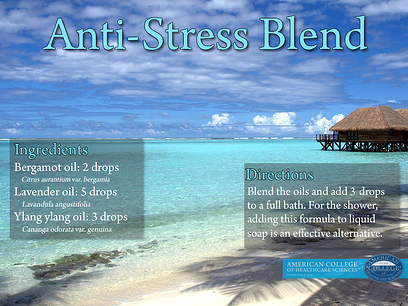 Calming Floral Blend:
Calming Floral Blend:
Lavender Lavandula angustifolia oil: 5 drops
Ylang ylang Cananga odorata var. genuina oil: 3 drops
Bergamot Citrus aurantium var. bergamia oil: 2 drops
Blend the oils and add 3 drops to a full bath or use a foot or hand bath once daily. Adding this formula to liquid soap and using it daily in the shower is also an effective alternative.
Clary Sage: Clear, Calm, and Content
The English name clary originates from the Latin sclarea, which was derived from clarus, meaning “clear.” I like to think of clary sage Salvia sclarea (L.) essential oil as “clearing” away the dark clouds of our mood, as it’s traditionally been known for its uplifting and euphoric actions. This is an oil you can recommend to clients to diffuse before bed or add to the bath for a relaxing, restorative soak.
But where’s the research?
A 2010 research study with rats documented clary sage S. sclarea essential oil’s uplifting effects [6], suggesting that it could be a useful holistic routine for those coping with depression and anxiety.
Additionally, a randomized controlled trial in 2013 suggested that clary sage S. sclarea essential oil may be useful—more so than lavender Lavandula angustifolia [Mill.]—in reducing stress for female patients undergoing urodynamic assessments.[7]
This relaxing bath blend could be an effective recipe:
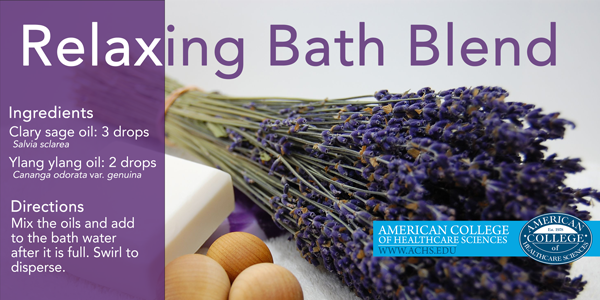 Relaxing Bath Blend
Relaxing Bath Blend
Clary sage Salvia sclarea essential oil: 3 drops
Ylang ylang Cananga odorata var. genuina: 2 drops
Add the essential oil to the bath after it is full. Mix the oils well and immerse yourself for a wonderful, relaxing soak.
Lavender: The Purple Flower of Peace
It’s no secret I’m a big fan of lavender L. angustifolia and its many wonderful properties. Not only does it smell divine, it is an extremely versatile herb and essential oil with a number of practical uses, including pest control, healthy sleep, and of course, promoting a balanced mood.
In a small but relevant double-blind trial, patients with mild to moderate depression showed improvement after receiving 60 drops of lavender tincture (1:5 in 50% alcohol) per day.[8]
A study in 2007 also showed that lavender aromatherapy reduced serum cortisol—which plays a central role in the body’s response to stress—in healthy men.[9]The researchers concluded: “These findings suggest that lavender aromatherapy has relaxation effects and may have beneficial acute effects on coronary circulation.”
Further, research suggests it’s possible that lavender essential oil can be an effective substitute for other common and potentially addictive psychoactive drugs used for anxiety. A 2010 study investigated the use of lavender with Generalized Anxiety Disorder (GAD). Silexan, an oral lavender oil capsule preparation, when taken over six weeks was shown to effectively relieve generalized anxiety comparable to a common benzodiazepine (lorazepam), a powerful psychoactive drug.[10] Researchers also noted:
The safety of silexan was also demonstrated. Since lavender oil showed no sedative effects in our study and has no potential for drug abuse, silexan appears to be an effective and well tolerated alternative to benzodiazepines for amelioration of generalized anxiety.
However, it’s important to note that these studies were assessing the soothing properties of lavender L. angustifolia and NOT lavandin Lavandula intermedia (Emeric ex Loisel.), which can have stimulating effects. As a reminder, be sure to inform your clients that it is crucial to check that the Latin name reads Lavandula angustifolia when using lavender essential oil for calming and uplifting purposes.
More Mood-Boosting Oils
While bergamot, clary sage, and lavender are excellent oils to support healthy mood, here are 10 more oils that can calm, brighten your day, or both:
- Basil Ocimum basilicum (L.)
- Geranium Pelargonium graveolens (L'Her.)
- Grapefruit Citrus paradisi (Macfad.)
- Lime Citrus aurantifolia (Christm.)
- Neroli Citrus aurantium (L.) var. amara
- Roman chamomile Chamaemelum nobile (L.) All.
- Rose Rosa damascena (Mill.)
- Sandalwood Santalum album (L.)
- Sweet orange Citrus sinensis (Osbeck)
- Ylang ylang Cananga odorata (Lam.) var. genuina
Is a Client Experiencing Symptoms of Depression or Anxiety?
While essential oils are wonderful additions to a wellness routine, depression and anxiety are serious mood disorders.
If you or a client are experiencing severe symptoms of depression or anxiety, please refer to a trusted physician, naturopath, or mental health provider, who may in fact suggest an aromatherapy regime.
Editors Note: This blog post was originally published in September 2014 and has been updated for accuracy. (January 2017)
Disclosure of Material Connection: I am the President and Founder of American College of Healthcare Sciences, the Institution that publishes this blog. However, all opinions are my own. This blog may contain affiliate links. I am disclosing this in accordance with the Federal Trade Commission’s 16 CFR, Part 255: “Guides Concerning the Use of Endorsements and Testimonials in Advertising.”
This article is for informational purposes only. It is not intended to treat, diagnose, cure, or prevent disease. This article has not been reviewed by the FDA. Always consult with your primary care physician or naturopathic doctor before making any significant changes to your health and wellness routine.
References
[1] de Gage, S., Moride, Y., Ducruet, T., Kurth, T., Verdoux, H., Tournier, M., et al. (2014). Benzodiazepine use and risk of Alzheimer’s disease: case-control study. BMJ, 349:g5205.
[2] Chang, S.Y. (2008). Effects of aroma hand massage on pain, state anxiety and depression in hospice patients with terminal cancer. Taehan Kanho Hakhoe Chi., 38(4):493-502.
[3] Ibid.
[4] Chang, K. & Shen, C. (2011). Aromatherapy Benefits Autonomic Nervous System Regulation for Elementary School Faculty in Taiwan. Evidence-Based Complementary and Alternative Medicine. Retrieved from: http://www.hindawi.com/journals/ecam/2011/946537/
[5] Saiyudthong, S. & Marsden, C.A. (2011). Acute effects of bergamot oil on anxiety-related behaviour and corticosterone level in rats. Phytother Res., 25(6):858-62.
[6] Seol, G.H., Shim, H.S., Kim, P.J., Moon, H.K., Lee, K.H., Shim, I., et. al. (2010). Antidepressant-like effect of Salvia sclarea is explained by modulation of dopamine activities in rats. J Ethnopharmacol., 130(1):187-90.
[7] Seol, G.H., Lee, Y.H., Kang, P., You, J.H., Park, M., & Min, S.S. (2013). Randomized controlled trial for Salvia sclarea or Lavandula angustifolia: Differential effects on blood pressure in female patients with urinary incontinence undergoing urodynamic examination. J Altern Complement Med., 19(7):664-70.
[8] Akhondzadeh, S., Kashani, L., Fotouhi, A., Jarvandi, S., Mobaseri, M., Moin, M., et al. (2003). Comparison of Lavandula angustifolia Mill. tincture and imipramine in the treatment of mild to moderate depression: a double-blind, randomized trial. Prog Neuropsychopharmacol Biol Psychiatry, 27(1):123-7.
[9] Shiina Y., Funabashi N., Lee K., Toyoda T., Sekine T., Honjo S., et al. (2007). Relaxation effects of lavender aromatherapy improve coronary flow velocity reserve in healthy men evaluated by transthoracic Doppler echocardiography. Int J Cardiol.,129(2):193-7.
[10] Woelk, H. & Schläfke, S. (2010). A multi-center, double- blind, randomized study of the Lavender oil preparation Silexan in comparison to Lorazepam for generalized anxiety disorder. Phytomedicine, 17(2):94-9.

